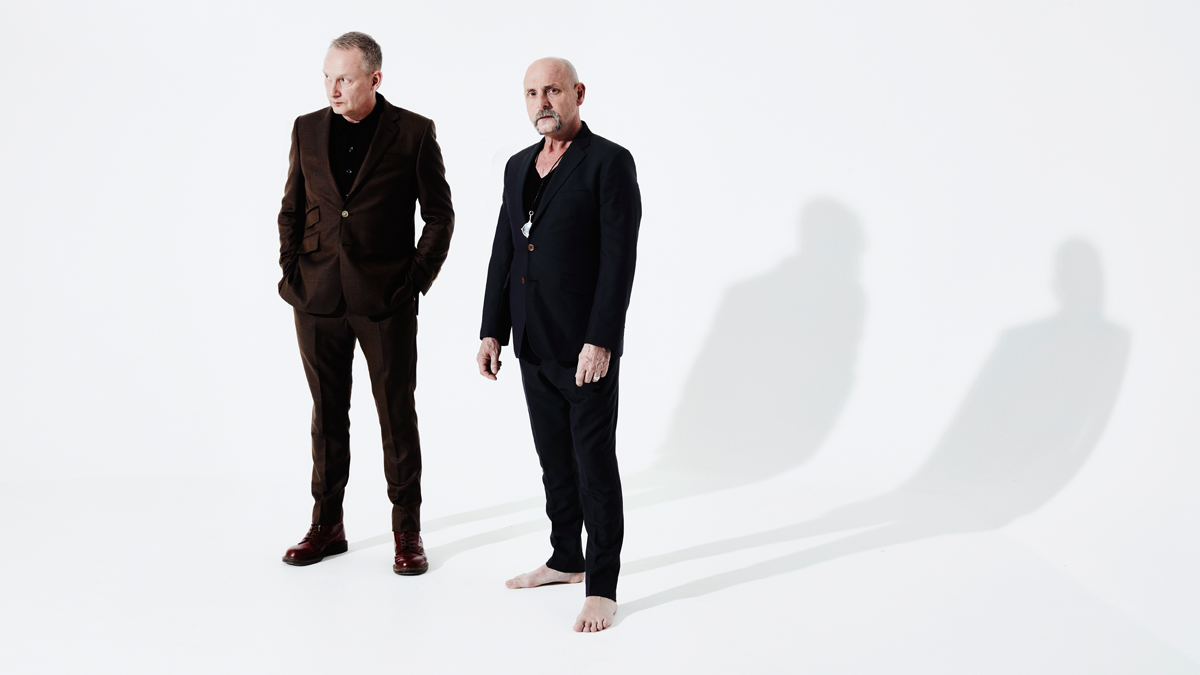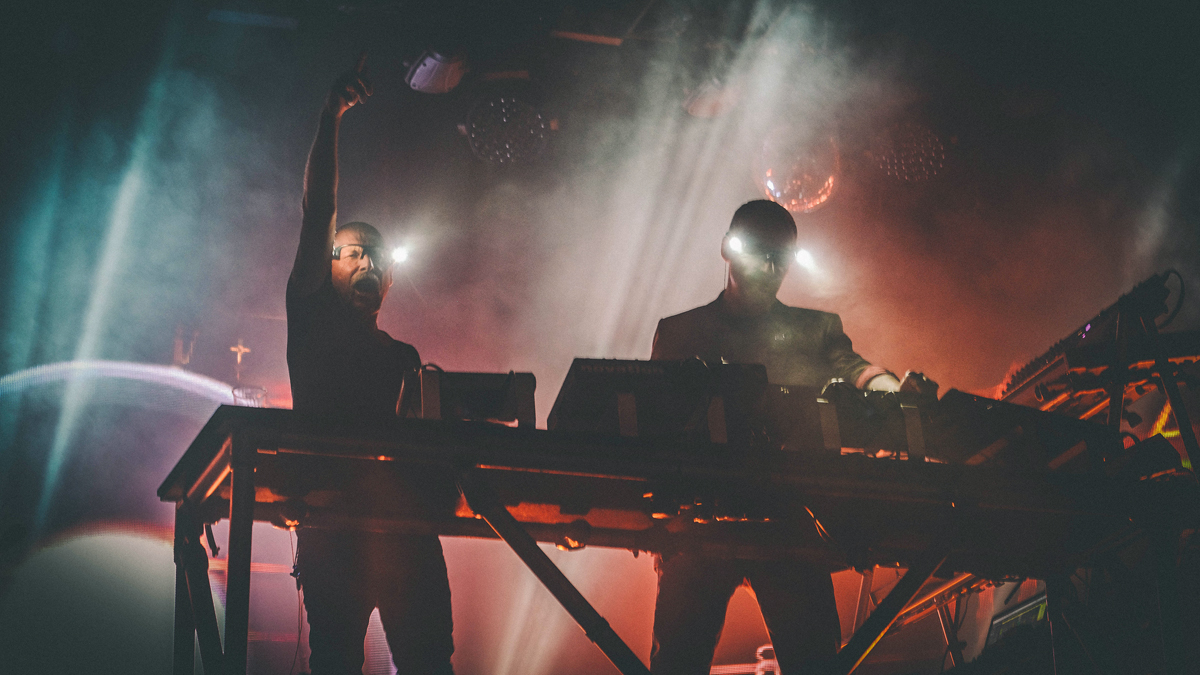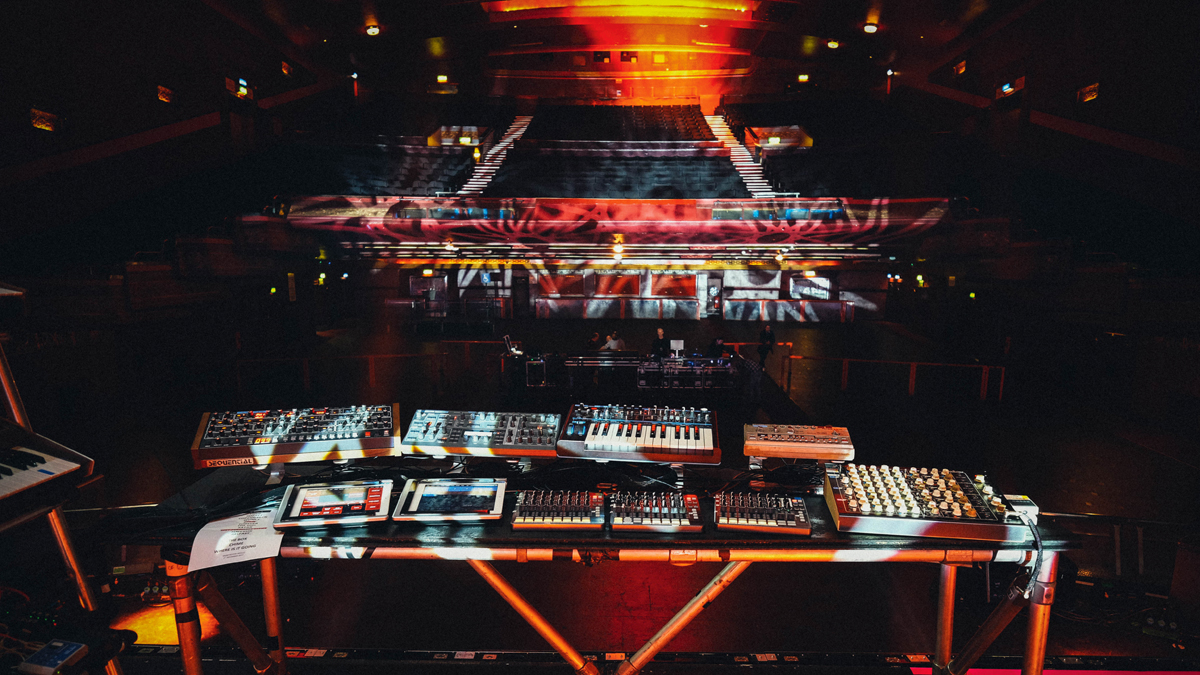Orbital: “The real joy for me is that I’ve got my brother back. That feels pretty sweet!”
The Hartnoll siblings on reconciling, getting their knobs back… and Brexit

Whichever way you figure it, British electronic music just didn’t feel the same without the Brothers Hartnoll, known to all and sundry, of course, as Orbital. Releasing their debut single, Chime, in 1989, Phil (no hair) and Paul (hair) beautifully captured the free-flowing rave ’n’ tech ethos of the time.
It’s no exaggeration to say that subsequent albums like Orbital [aka the Green Album] (1991) and Orbital [aka the Brown Album] (1993) helped shape the sound of dance music in the early-’90s, but their recorded output was probably outgunned by their spectacular live shows. There you are, in a field on a warm summer’s evening. Off in the distance, you can just about see two heads, bobbing up and down, flanked by sci-fi LED glasses and framed by a massive screen of dancing colours and images.
In effect, it’s two blokes with some drum machines, samplers and sequencers, but, under a carpet of stars and just in front of the chip vans, so much more. If Orbital were on the bill for whichever was your choice of festival at the time, you knew you were in for a good time.
There was chart success - three top 10 albums and top 5 singles - along with soundtrack work in Hollywood, but behind the scenes, relations weren’t as amicable as they are today, and the brothers decided it was time to take a break in 2004. It was billed as a ‘split’, but they were back together by 2008, and even had the honour of opening the 2012 Paralympic Games with the late Professor Stephen Hawking; the great man was wearing the trademark Orbital LED glasses!
Unfortunately, there would be another split a couple of years later. Both Phil and Paul were living in Brighton, but there were rumours that they were no longer on speaking terms and that the studio was being divvied up between the two. This time, sadly, it seemed like the split was going to be permanent.
“Don’t ask me what happened, ’cos I don’t think either of us can really work it out,” says Phil, between coughs. “Sorry, it’s the first one of the day,” he adds, waving a hand and a cigarette about enthusiastically.
“It was just one of those family things. We ended up not speaking to each other for almost five years.”
Want all the hottest music and gear news, reviews, deals, features and more, direct to your inbox? Sign up here.

Hatchets and 909s were eventually buried in 2016, and a selection of top-notch, well-received live shows last year convinced the brothers they’d made the right decision.
Then came the day: Phil and Paul Hartnoll were back in their Brighton studio, working on a brand new album, Monsters Exist - the first new Orbital album for six years.
They’re together again today, not far from the studio. As befits their reputation as two of the nicest blokes in the music business, they remain just as welcoming and as entertaining as ever. And they’re ready to chat...
Well, I suppose we’d better tackle the elephant in the room before we go any further. The split. From the outside, it seemed almost acrimonious…
Phil: “The main problem was that there was no communication. Like I said before, I don’t really know if anything kicked it off. OK, I have an idea and I’m sure Paul’s got his ideas, but does it matter? I’m just pleased that we’ve managed to get past it.
“Although two brothers not speaking is extreme, I’m sure it happens in lots of families. Sometimes, the only thing you can really do is leave it for a while... step away. You give things a bit of time and, all of a sudden, that stuff you fell out over doesn’t seem so important.”
Paul: “Families are families. And sometimes you can’t work them out. Stuff happens and it’s not always easy to understand what has happened or how to fix it. And the likelihood of there being problems is always increased if you’re working together because of the pressure, the worry and the time you spend together.
“But time is a weird thing and it does weird stuff to your life. As time goes on and you get a bit older, you get a bit wiser. You can be doing the same thing that you did 10 years ago, but, this time, you’re much better at handling it because your attitude has changed. You’re better at navigating the choppy waters of life.
Families are families. And sometimes you can’t work them out
“After we split up, I kept myself busy doing various bits and pieces, but there was this one moment towards the end of 2016 where I thought, ‘What is the one thing that you’re really good at? The thing that you’ve been doing for almost 30 years. Why aren’t you doing that?’thing?’ This went around my head for a while and, out of nowhere, I said, ‘Fuck it! I want my old job back!’.
“The one thing that was stopping me getting my old job back was that me and Phil weren’t speaking to each other. OK, we need to do something about that. So... tentatively, we had a coffee. Simple as that. It didn’t take too long before we were having a laugh and we said, ‘Let’s give it a whirl’.
“The thing about Orbital is that we’ve never tried to make music to make money. We make music for the sake of making music. And being Orbital gives us both a fantastic platform to do ‘art’ and to make our music. To not use that platform just seemed silly.”
How did it feel to be sitting next to each other behind a mixing desk when you started work on Monsters Exist? The same old comfortable way of working?
Paul: “Comfortable and uncomfortable. But that’s how we’ve always worked. We bounce songs off each other. But it comes back to that idea of time and wisdom and... I simply didn’t want to fall out with my brother again. This time, I won’t let go of our relationship.”
Phil: “Essentially, the starting point for the album was a bunch of demos that Paul had lying around. The album flowed from there very naturally. He sent them all over to me and I started listening back to everything; jumping onboard with the ones that really stood out.
“I don’t think we’ve ever felt that an Orbital album should sound like this or this, so I went into the studio with no barriers. The music would take us where it needed to take us. And with the way Paul works, some of the demos were already headed in their own direction; they were virtually complete.
“Others needed stripping down and rebuilding from the ground up. Some tracks didn’t quite fit, but it didn’t take us long to work out how everything was going to be pieced together. Because of the gap, we both felt we were coming at this project with fresh ears. The sense of momentum and energy felt wonderful.
“The linchpin for me was the title track. Once we had that song in place, everything started to make sense.”
You’ve never been afraid of sinister atmospherics, but that title track really does sound dark and disturbing.
Phil: “We’re trying to say monsters do exist!”
And recent Orbital statements seem to indicate the identity of said ‘monsters’. Politicians in particular. That fella in the White House...
Paul: “You know what? It feels like we’re living in a Monty Python sketch about how shit politics is. The trouble with the vast majority of this generation of politicians is that it’s not a vocation for them. They aren’t there to make the world a better place. They see it as a career... a step up the ladder.”
Phil: “Politically, the whole world is in a big fucking hole. Jesus! The Peace Treaty is turning into a fucking shambles. The environment. Fucking irresponsible, that’s what it is.
“Brexit! A fuck-up! No matter which side of the fence you sit on, the vote has ended up with utter confusion. No one knows what the fuck Brexit means anymore. And the British politicians suddenly start saying, ‘Oh, we have to listen to the will of the people’. Really? If you are listening to the British people, it would be the first time ever! The first time that any politician has ever listened to us. A fucking joke!”
Brexit! A fuck-up! No matter which side of the fence you sit on, the vote has ended up with utter confusion. No one knows what the fuck Brexit means anymore.
That’s the trouble with Orbital. You always sit on the fence!
Phil: “Ha! I don’t know if people think of us as a political band, but there are a few things we seem to be getting off our chests with this album. With the recent single, P.H.U.K. and its video [which features everything from Grenfell and rough sleepers to bombs and moped muggings], I know that title looks a bit provocative, but initially it was just something we used in the studio. P.H... Paul Hartnoll, Phil Hartnoll. U.K... ooh, look, that says PHUK!
“Then somebody said, ‘P.H.U.K. Please Help United Kingdom’. As soon as we heard that, it was like, ‘Oh, yes! Now we’re off. Now we’re going somewhere’. It all came together.”
Paul: “The whole album came together very quickly. About four months in total. It almost felt like we were making our first album together. There was a lot of emotion and experience and musical ideas that filled up those five years, and they all came flooding out when we got into the studio again.”
We’ve interviewed you in several studio spaces over the years, and there’s always been a lot of hardware. Have you downsized at all?
Phil: “We downsized the live setup when we first got back together for those gigs last year. There was a lot of flying around involved and we hadn’t worked together for ages, so we decided to keep it simple. Ableton [Live] allowed us to replace a lot of the hardware we used to work with on stage... the MMT-8 sequencers, samplers, some of the big old analogue beasties.
“But, as the gigs progressed, and we started to get a bit more confident, a few synths began to creep back in, and flight cases seemed to get a lot bigger!”
Paul: “I’ll openly admit that I’ve got far more synths than I’ll ever need. Far more synths than is healthy. But I love them, so no apologies.
“From about 2000, I did start moving into the box. Software was really getting its act together and, with the spirit of exploration that’s driven so much of our music, I decided to investigate. Absynth! Massive! Fucking brilliant! And they still are. Mind-bending synths!
“But then, one rainy afternoon I turned on the old ARP 2600 and I thought... ‘Hmm, exploration is all very well, but this is incredible’. That led me to get one of the new Voyagers. Bloody hell! It was as if I’d been driving a VW Polo and somebody had stuck me behind the wheel of a Ferrari. Then I found a Jupiter-8, a Putney [VCS 3], a MacBeth M5N. These days, software comes close - I’ve got the full Arturia set - but there’s a lot of joy in the 5% extra fidelity of analogue and getting your knobs back.
“You treat synths in a different way when you’ve got all the controls sitting in front of you. You compose in a different way. Let’s say, you’ve got a rough idea of a bassline, you’ve got the arrangement and you’re having a crack with he M5N. You immediately start fiddling with knobs and, within 30 seconds, you’ve lost your original sound but you’re onto something far more interesting. There’s a small bit you’re not happy with, so you have another go. Hang on, now you’ve got stereo M5N!

Phil mentioned that Ableton Live is your live platform. Is it the studio choice, too?
Paul: “At the moment, yes. When we first started making music, I was on C-Lab Creator, then I went to Logic, all the way up to 9. After X came out... let’s just say that X pushed me towards Ableton. The timestretching is what does it for me. Yes, Logic can timestretch now and, sometimes, it manages to sound very musical. But the problem is that it’s a bit hit-and- miss. You can’t guarantee the results. Ableton is always razor sharp. What’s not to love!
“I probably ought to upgrade my Apple laptop, but I don’t actually use that much software, so it seems to be OK at the moment, really. I’ve got NI Komplete and the Arturia bunch on there... most of the stuff from Soundtoys. But it’s highly unlikely that you’ll ever find an Orbital song running 50 soft synths. The studio is full of analogue blunderbusses, so I might as well use them.”
Do you mix in the box?
Paul: “I do, and I’ve got no problem with that at all. Ableton delays. Valhalla reverb. Aren’t they amazing? The Valhalla reverbs give me everything that I used to love so much about Lexicon hardware. Yes, you could argue that a mix sounds better if you stick it through a mammoth SSL desk, but I think it’s perfectly possible to get a fantastic mix inside the computer as well.”
Well, whatever you used... it seems to have worked. There is a real muscular punch that only adds to the album’s overall malevolent feel.
Paul: “Ah... malevolent. Just like this world we’re living in!”
Phil: “Y’know the best thing about this album? Yeah, I love talking about the music and being in the studio. I love going out on tour. But the real joy for me is that I’ve got my brother back. Me and Paul are talking to each other. That feels pretty sweet!”
The new Orbital album, Monsters Exist, is out on 13 September. They are currently touring the UK.

I’m the Deputy Editor of MusicRadar, having worked on the site since its launch in 2007. I previously spent eight years working on our sister magazine, Computer Music. I’ve been playing the piano, gigging in bands and failing to finish tracks at home for more than 30 years, 24 of which I’ve also spent writing about music and the ever-changing technology used to make it.